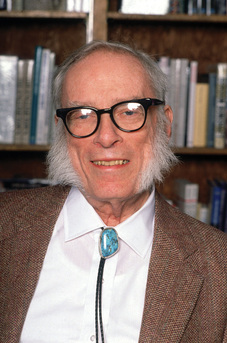|
There's a point to all this that brings the subject at hand up to the present, but first some background. I've read several books by Isaac Asimov, though only a tiny percentage of his collection. After all, he wrote or edited over 500 books. Though he's known for science fiction (with a very heavy emphasis on grounded "science"), he also wrote a great deal of non-fiction, including books on mathematics, chemistry and even as widespread as Shakespeare and the Bible. (One of his quotes is, "People who think they know everything are a great annoyance to those of us who do.") Even if you've never read anything by Asimov, who passed away in 1992, you may have seen movies based on his work, most successfully (and most recently), I, Robot, but also Bicentennial Man, among others. (I, Robot was only tangentially based on Asimov's novel. It was largely based on a separate screenplay, and the rights to Asimov's book were purchased and aspects of it were incorporated.) He famously devised the Three Laws of Robots, which most purist science fiction writers even today still follow.
The "Laws" were written for his 1942 story, Runaround --
At his best, even in his extensive series of books on robots, Asimov's writing was more about humanity, society and psychology than gadgets. He wasn't the greatest stylist, though was good and thoughtful, but mainly knew how to weave a tale. His most famous work was The Foundation Trilogy, which I loved, finding it gripping, operatic storytelling. He created an intricate, intergalactic universe about societal development, the battle for dominance, and hidden mysteries, all of which out-Star Wars that decades-later movie series. I only read one of the many sequels (and prequel) that he wrote years later, however. True, deep fans devour them all, though I was content with leaving things at the self-contained original. But I think my favorite of his works is the short story, Nightfall, about a world that has six suns and so only every 2,049 years do they have an eclipse -- and this world that doesn't know darkness must face it. The story takes place leading up to that one night and how the society deals with it, as a scientist investigates what has happened in the past, racing the clock as layer by layer he uncovers the truth. It's a gripping psychological thriller. By the way, in 1968, the Science Fiction Writers of America had several votes of experts to determine the "best" in various categories. The best short stories were released in a two-volume set the title, the Science Fiction Writers of America Hall of Fame --and Nightfall was named the #1 science fiction short story of all time. Not bad -- but then in another vote, The Foundation Trilogy was also named the best science fiction trilogy of all time. Another of his great quotes remains quite apt today. "Creationists make it sound as if a 'theory' is something you dreamt up after being drunk all night." Battling that one neck-and-neck is this related Asimov quote: "The saddest aspect of life right now is that science gathers knowledge faster than society gathers wisdom." Anyway, all of this is a prelude to note that back in 1964, in honor of the New York World's Fair, Isaac Asimov wrote an article with predictions for 50 years later, "Visit to the World's Fair of 2014." Since it's now officially 2014, Drew Prindle of Digital Trends Today revisited that original article to see how much Asimov got right and wrong. (I came upon this after reading a similar piece in the Huffington Post. I was going to link to that one, but was a bit bothered by the author's analysis which seemed to have little awareness of actual science. Mr. Prindle does a far better, more insightful job. One would expect anyone making predictions for half a century in the future to get most of it very wrong. What's impressive is how much Isaac Asimov got very right. You can read that article, "10 Predictions That Isaac Asimov Got Right 50 Years Ago (and 5 that he botched)" by clicking here.
0 Comments
Leave a Reply. |
AuthorRobert J. Elisberg is a political commentator, screenwriter, novelist, tech writer and also some other things that I just tend to keep forgetting. Feedspot Badge of Honor
Archives
June 2024
Categories
All
|
|
© Copyright Robert J. Elisberg 2024
|







 RSS Feed
RSS Feed